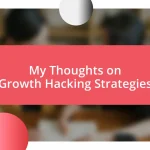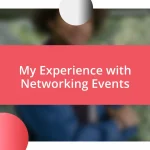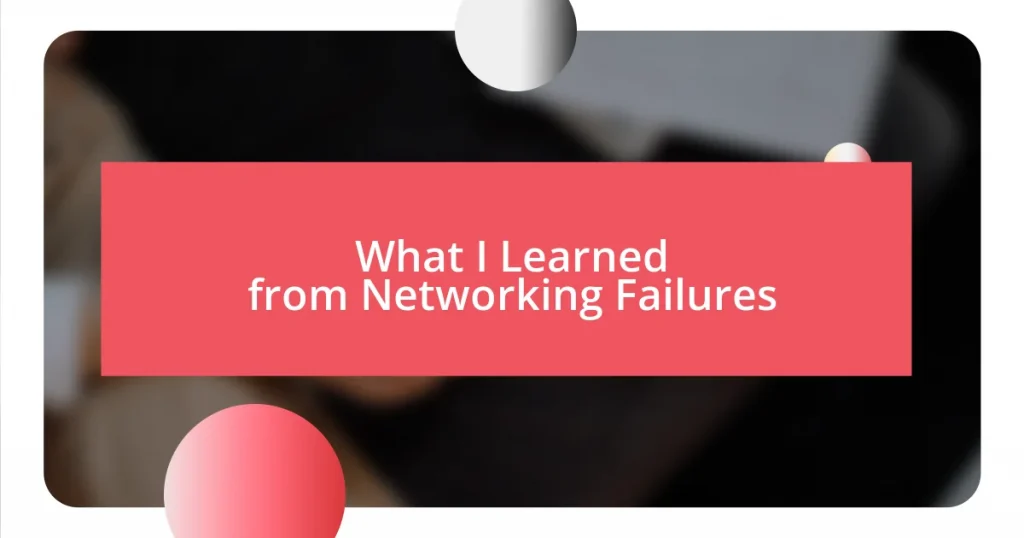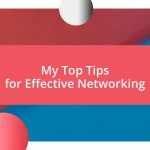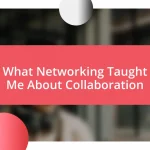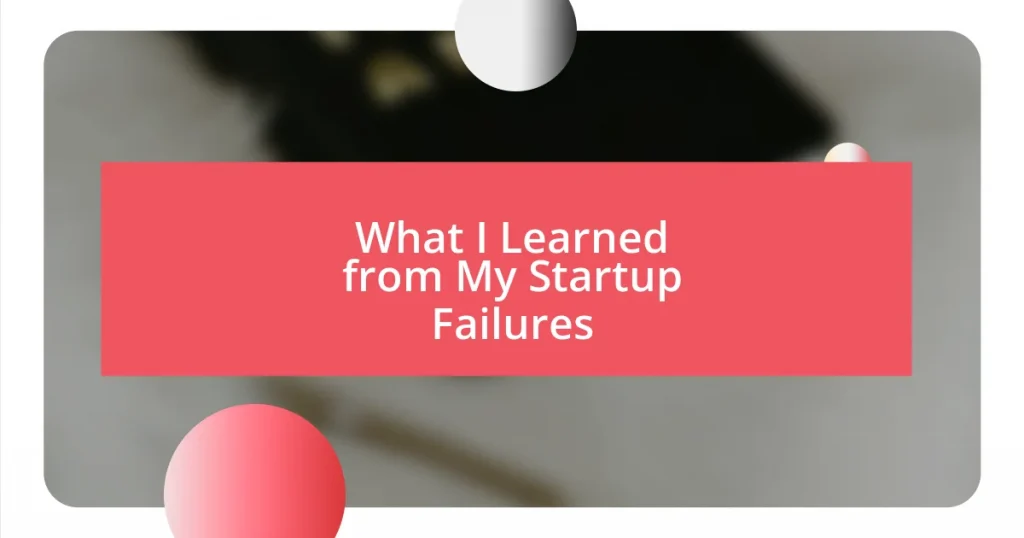Key takeaways:
- Meaningful connections in networking outweigh the quantity of contacts; authenticity and vulnerability foster deeper relationships.
- Common networking mistakes include neglecting follow-ups, self-promotion, and not listening actively; self-reflection helps identify these failures.
- Building resilience in networking involves adapting from failures, maintaining a long-term perspective, and transforming missteps into opportunities for growth.
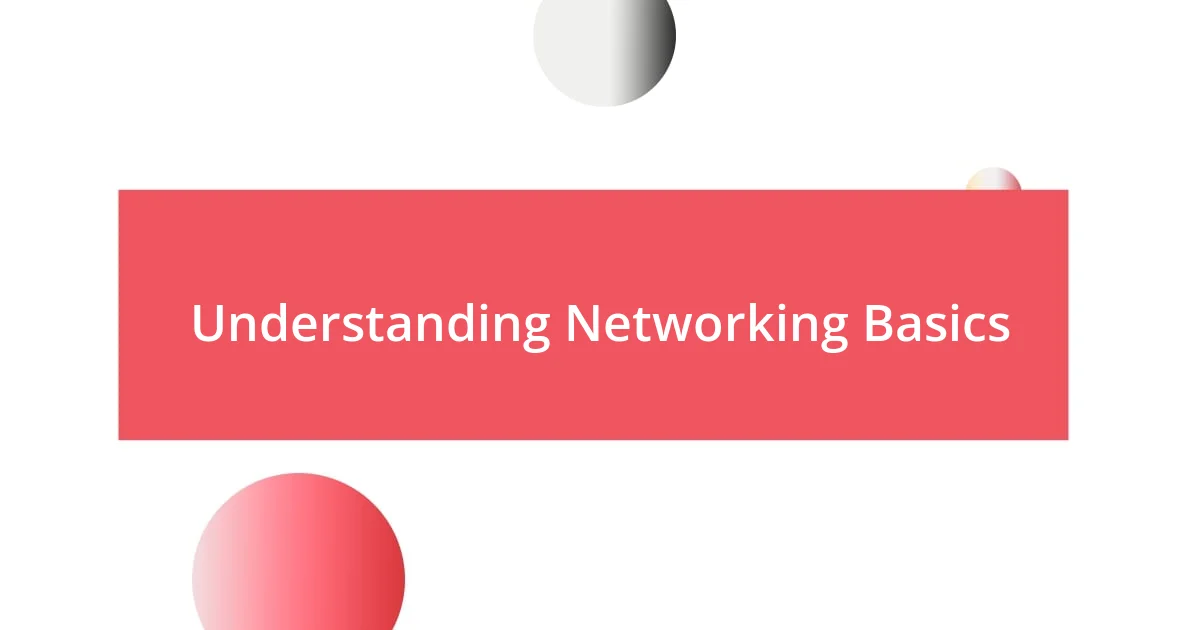
Understanding Networking Basics
Networking is often seen as the act of exchanging business cards, but I’ve come to realize it’s much deeper than that. When I first started out, I thought having a wide network meant success; however, I soon understood that meaningful connections matter far more. Have you ever felt overwhelmed at a networking event, thinking you had to talk to everyone? I certainly have.
As I navigated various networking events, I learned that it’s crucial to approach it as a two-way street. Listening to others not only enriches the conversation, but it also helps you build authentic relationships. I remember speaking to a fellow entrepreneur who shared his struggles; it clicked for me that vulnerability might be the best way to forge a bond. How often do we focus on showing our successes instead of our challenges?
Understanding the basics of networking also involves recognizing the importance of follow-up. In my experience, reaching out after an event to thank someone or continue a conversation can set the stage for a long-term connection. It may feel daunting, but I can assure you that a simple message can open doors you never anticipated. Have you tried it yet? If not, you might just be surprised at the relationships that blossom from that initial connection.
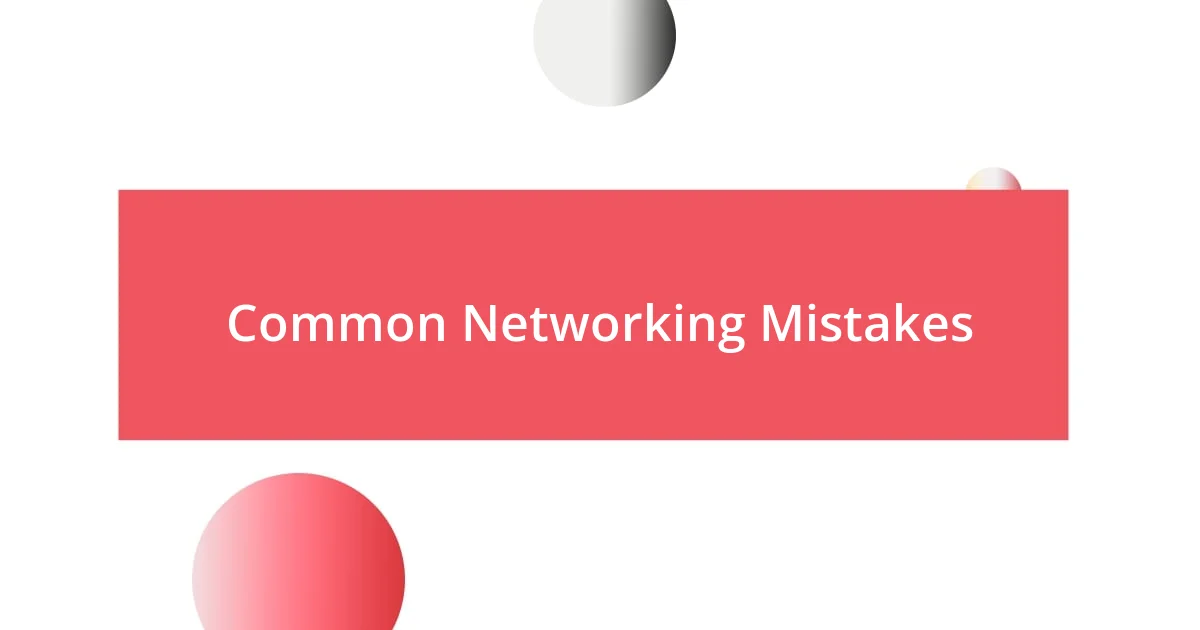
Common Networking Mistakes
Networking can be tricky, and I’ve certainly stumbled along the way. One of my biggest mistakes was attending events without a clear purpose. I remember showing up with no plan, feeling like I had to collect as many business cards as possible. In reality, it felt more like a race rather than genuine engagement. It’s essential to know what you hope to gain from each interaction.
Here are some common networking mistakes I’ve identified along my journey:
– Neglecting to Follow Up: Leaving without nurturing connections can undermine all efforts made.
– Overwhelming Others with Self-Promotion: Constantly talking about yourself can turn conversations sour.
– Not Listening Actively: Engaging only to respond can leave the other person feeling unheard.
– Focusing Too Much on Quantity Over Quality: Building a large network doesn’t mean much without meaningful relationships.
– Being Inauthentic: Trying to present a facade rather than your true self can hinder genuine connections.
I’ve found that genuine connections are often built on shared experiences and emotions. When I shared a personal setback at one event, it created an immediate connection. People appreciated my honesty, and our conversations deepened as a result. This taught me that vulnerability often paves the way for stronger bonds.
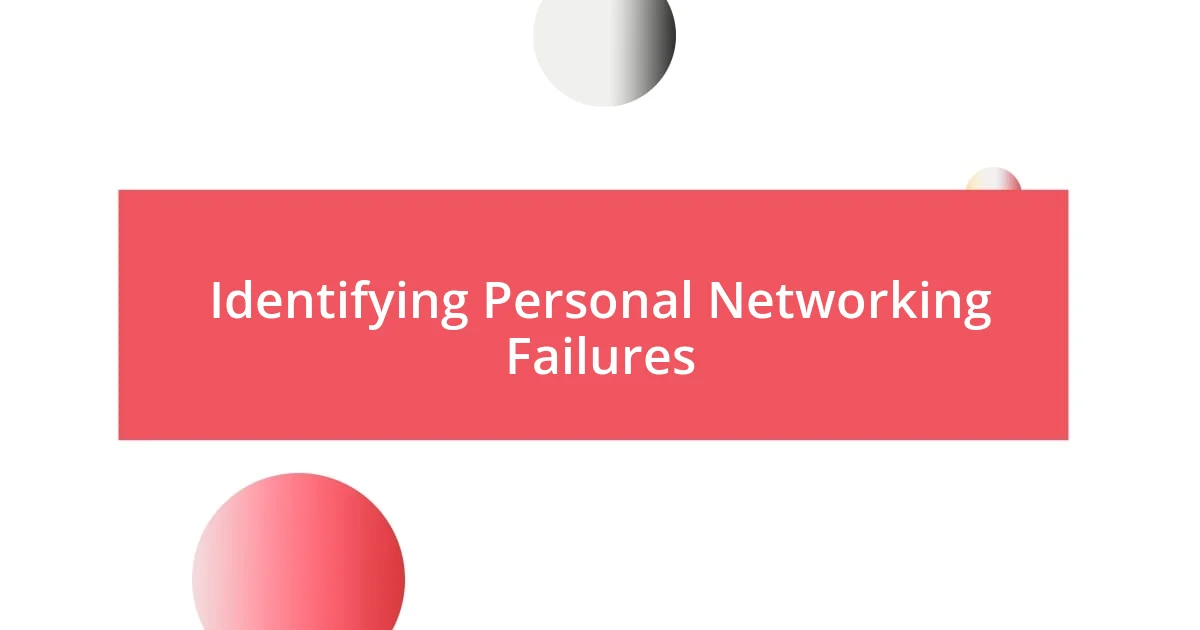
Identifying Personal Networking Failures
Identifying my networking failures felt like peeling back layers of an onion—each tear revealing something new and often uncomfortable. It was eye-opening to realize how often I entered conversations with preconceived notions about others, limiting my ability to genuinely connect. I recall one event where I cosseted myself in a corner, too anxious to mingle, thinking everyone else was more interesting. This self-inflicted isolation taught me the hard truth: I was the barrier to my own success.
I also learned about the importance of self-awareness in recognizing these failures. One time, after an industry conference, I gathered feedback from a trusted friend. They pointed out that while I spoke passionately, I often didn’t gauge whether my enthusiasm was reciprocated. It struck me that I had been too focused on presenting my ideas instead of inviting others into the discussion. This realization nudged me to adopt a more balanced approach to conversations—one where listening becomes just as important as sharing.
My experience taught me to meticulously evaluate my networking events afterward. I began keeping a simple journal that noted what went well and what didn’t during my interactions. For instance, I found that when I entered a conversation with curiosity rather than a checklist of what I wanted to achieve, the results were always more rewarding. Such reflections transformed failures into lessons, helping me to pivot and grow.
| Networking Failure | Lessons Learned |
|---|---|
| Entering conversations with preconceived notions | Keep an open mind and embrace curiosity. |
| Talking too much without gauging interest | Focus on listening actively to engage others. |
| Failing to reflect on networking experiences | Journaling helps to identify patterns and areas for improvement. |
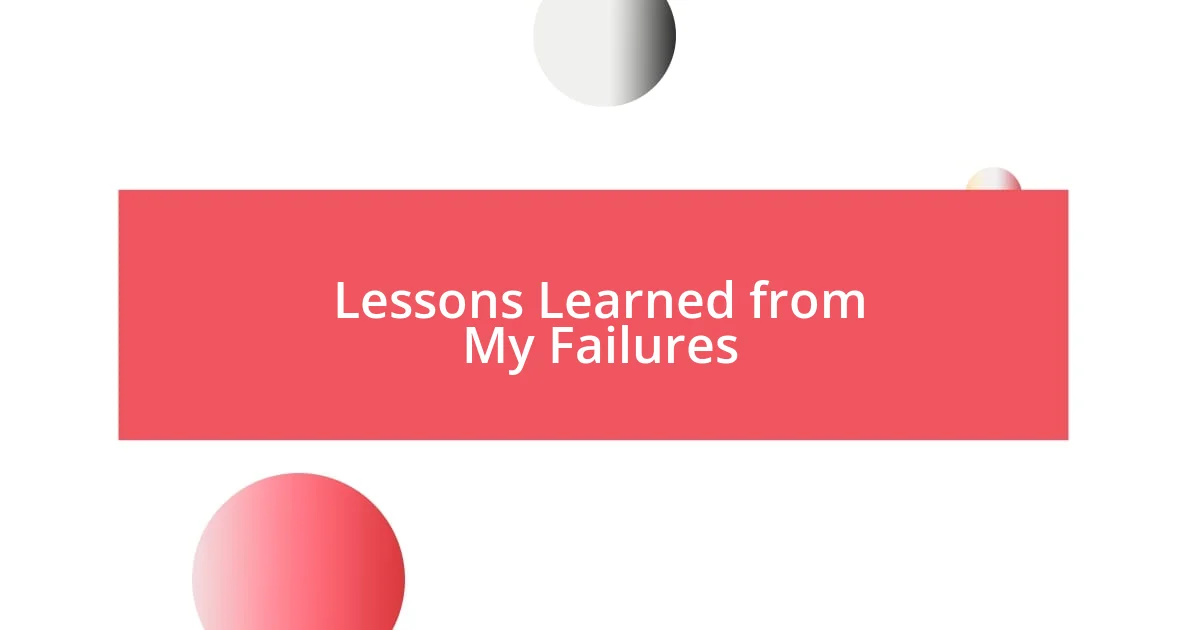
Lessons Learned from My Failures
One of my most significant lessons from networking failures was recognizing the value of authenticity. At a particularly large event, I felt the pressure to impress everyone, so I exaggerated my accomplishments. It wasn’t until I saw the perplexed expressions on people’s faces that I realized how off-putting that approach can be. Have you ever felt that disconnection when you weren’t being your true self? I learned that being genuine fosters deeper relationships, and people tend to gravitate toward honesty.
I also discovered the significance of vulnerability during a moment of honesty at a smaller gathering. I shared a personal story about a challenge I faced in my career, and it resonated more than any polished pitch ever could. It made me wonder: what if we each took the risk to share our struggles instead of just our successes? That evening, I formed connections that were much more meaningful, highlighting the power of shared experiences.
Reflecting on my networking efforts became a game-changer. After a particularly unsuccessful conference where I felt out of place, I took the time to jot down my feelings and observations. It hit me that I had spent the whole time worrying about making an impression rather than enjoying the conversations. This misstep taught me the importance of self-reflection in personal growth. Have you ever felt weighed down by expectations in social settings? I realized that by focusing less on my perceived shortcomings, I could fully engage in the moment and genuinely connect with others.
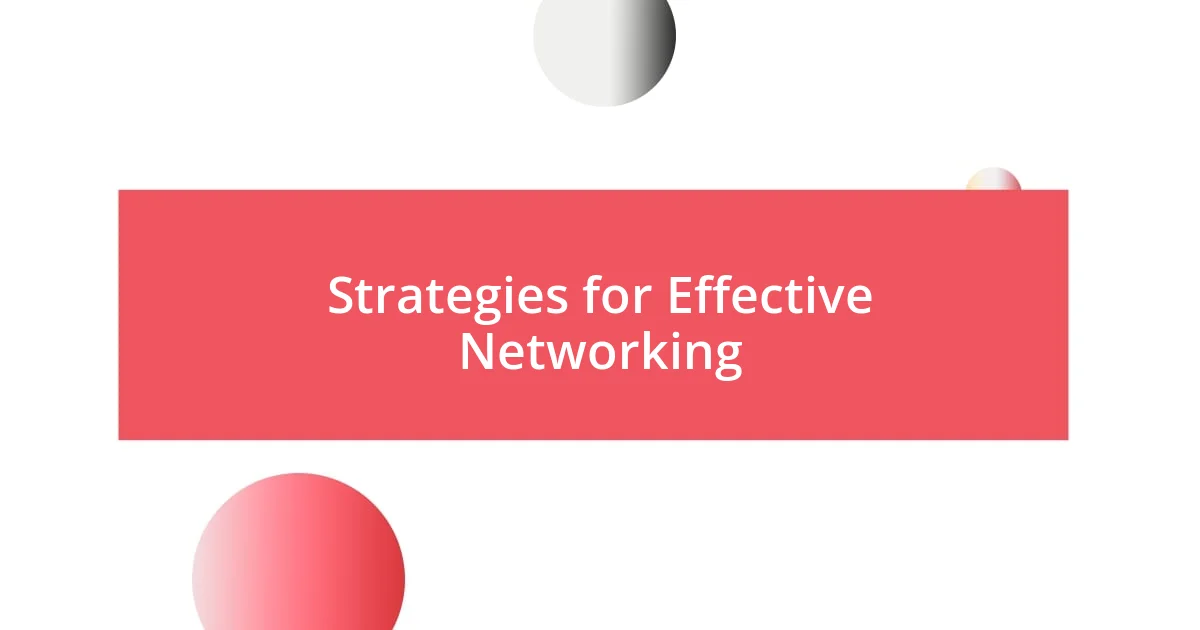
Strategies for Effective Networking
Building effective networking strategies takes both practice and reflection. A simple yet powerful tactic I’ve adopted is to set specific goals before attending an event. For instance, I once aimed to connect with at least three new people without getting bogged down by small talk. This focus turned my anxiety into excitement, reminding me that each conversation is an opportunity to learn and share. Have you set similar goals in your networking efforts, or do you sometimes find yourself drifting aimlessly?
Another strategy that has worked wonders for me is to ask open-ended questions. I remember one time at a meetup where I asked a fellow attendee about their biggest challenge in their current project. Their face lit up, and our conversation flowed organically from there. It was fascinating to realize how much deeper connections could be made simply by inviting others to share their thoughts. Are you currently using questions as a way to draw people into meaningful dialogue?
Lastly, I highly recommend pursuing follow-ups after initial meetings. Following up can seem daunting, but I’ve found that sending a personalized message a few days later has often led to fruitful relationships. For instance, I once reached out to a new contact to share an article related to a topic we discussed. This small gesture sparked an ongoing exchange of ideas and insights. Have you considered how a simple follow-up could enhance your networking success?
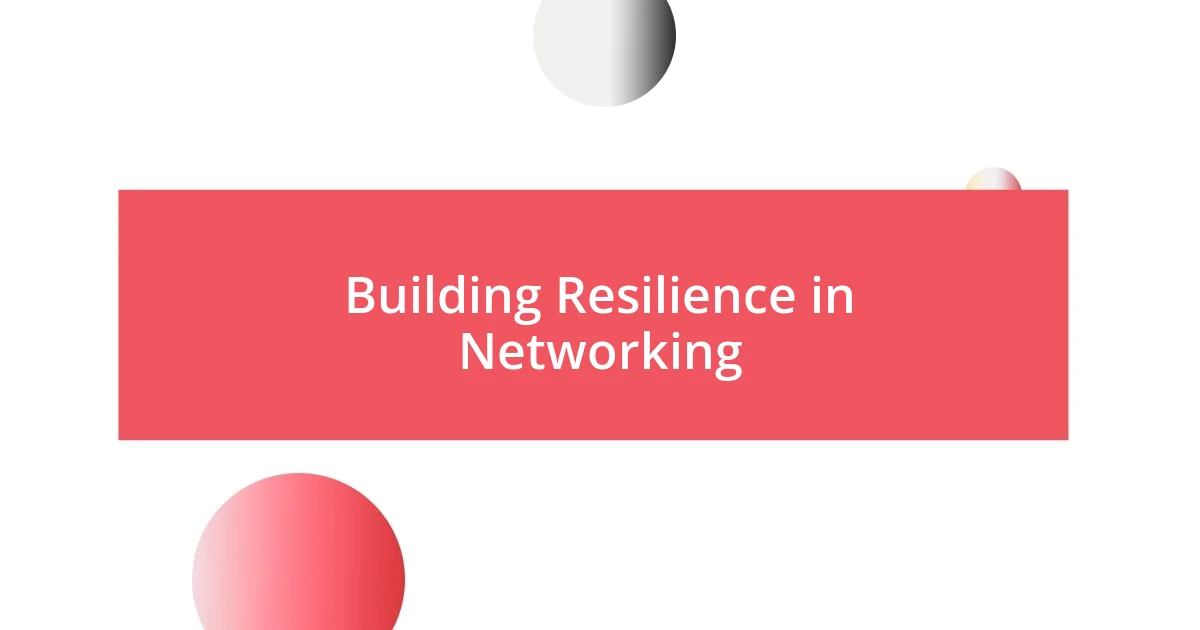
Building Resilience in Networking
While reflecting on my networking failures, I realized that resilience isn’t just about bouncing back; it’s about adapting and growing from the experience. I distinctly remember a networking event where I misjudged the atmosphere and shared an overly ambitious proposal. It fell flat, and the uncomfortable silence that followed felt like a punch to the gut. In that moment, I learned that failure is a stepping stone to improvement. Have you ever faced a moment where you wished you could hit rewind? I’ve found that embracing these moments allows me to recalibrate my approach and emerge stronger in my next interaction.
Another lesson in resilience came during a networking lunch that didn’t go as planned. I expected a stimulating discussion, but instead, the table was filled with silence. Instead of wallowing in embarrassment, I took a deep breath and initiated a light-hearted story about a recent mishap at work. The shift was almost immediate; laughter flowed, and conversations blossomed. This taught me that resilience is about recognizing when to pivot and create connection, even in less-than-ideal scenarios. Have you ever turned an awkward silence into laughter? It can be transformational.
I’ve also learned that maintaining a long-term perspective fosters resilience in networking. At times, I’ve placed a lot of pressure on myself to build immediate connections, but I’ve discovered that relationships take time to cultivate. A few years back, I connected with someone at an industry event who didn’t seem interested at first. Instead of pushing, I followed up over the months with articles and insights relevant to their interests. Eventually, this person became one of my most valuable connections. I now understand that patience in networking can lead to fruitful relationships that withstand the test of time—how do you view the timeline of your networking efforts? It’s a journey, not a race.
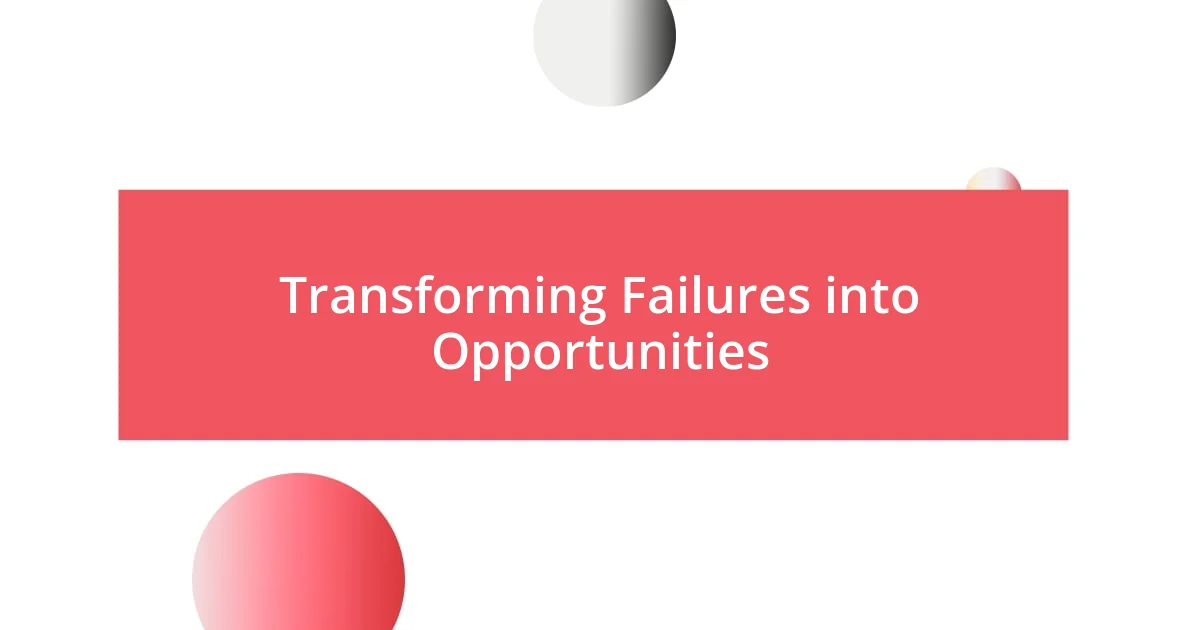
Transforming Failures into Opportunities
Transforming failures into opportunities is a journey I’ve embraced wholeheartedly. There was a time I attended a major conference where I aimed to connect with industry leaders, but ended up feeling invisible among the sea of attendees. Instead of allowing that sensation to defeat me, I took a step back and reflected on what went wrong. I realized that focusing solely on high-profile connections had led me to overlook the value of conversations with fellow attendees, many of whom were on similar journeys. This shift in perspective opened countless doors I hadn’t initially considered.
One of my most memorable failures happened at a small networking mixer. I mistakenly dominated a conversation, thinking it would showcase my expertise. When I noticed the group became disengaged, I took a moment to pause and ask for their thoughts on the topic instead. The shift was electric; suddenly, everyone started contributing. I learned that actively creating space for others can turn a sputtering conversation into a vibrant exchange of ideas. Have you ever felt the energy change in a room just by inviting others to share?
Now, I actively seek feedback from my networking experiences, viewing every encounter as a lesson rather than a test. A year ago, I reached out to a connection I hadn’t spoken to in months to discuss potential collaboration. Their honesty about my approach stung at first, but it became clear they were providing insights that would elevate my networking game. Instead of feeling diminished, I embraced that feedback as a powerful tool to refine my strategy. I ask you, how often do you invite insights from your network? It can be a game-changer.



